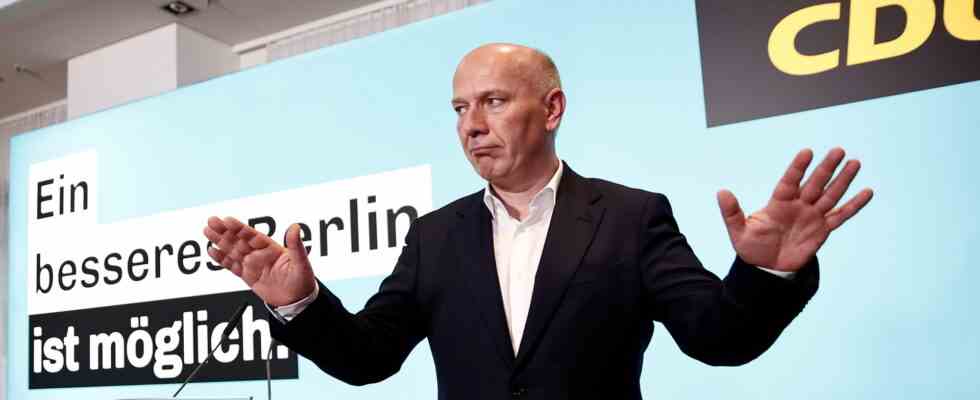portrait
Status: 07.02.2023 2:39 p.m
Kai Wegner is unknown to many people – also in Berlin. Nevertheless, the polls see his CDU ahead of the repeat election. His greatest trump card: dissatisfaction with red-green-red.
Kai Wegner is clearly too late. The CDU top candidate blames the red-green-red state government: “It was up to the traffic senator,” he says, explaining that unfortunately he had to drive across town and back again. There are traffic jams and construction sites everywhere.
Wegner is in the election campaign – and that means attack. The place and time of the attack on the political opponent may seem unusual – a visit to the “Alte Münze”, a cultural institution in Berlin City East – but Wegner currently only knows one mode: a frontal attack on the Berlin government.
The ruined city
The polls prove him right. His CDU is ahead, his issues are often the same that many Berliners are concerned with: a public administration that is only operational to a limited extent, a security situation that seems shaky and a transport policy that not only promotes public transport and cycling, but also directly targets cars .
The best example of the mobility policy of the current red-green-red senate can be found right in front of the door of the cultural center: here, right next to Alexanderplatz and in front of the Red City Hall, one of the city’s largest intersections is currently being renovated. When everything is finished, the area should be at least partially car-free. Not everyone in the capital likes such projects.
The “Alte Münze” is about cultural politics. Wegner wants to “raise it to another level”. What he means by that is not entirely clear. After all, culture is one of the few fields in which Berlin has really been shining for years. But this flank also wants to be closed and so Wegner presents his candidate for the office of Senator for Culture.
Actually, however, he is primarily concerned with emphasizing how badly the Social Democrats have ruled the city in ruins: streets, schools, households, the police, fire brigade – according to Wegner, everything is in a more or less desolate condition. An assessment that many Berliners would probably not contradict too loudly.
Wegner promises normality
The 50-year-old has made an election program out of displeasure: stop experimenting, back to objective politics – that’s how his message can be summed up. Or even shorter: consistently conservative.
Wegner promises normality. Under his leadership, it should again be possible to get an appointment at the Citizens Registration Office without having to wait for weeks to be there at the right moment for the online allocation. In order to get the dysfunctional administration under control, Wegner even wants to change the state constitution. In the capital of muddling through, an administrative reform almost seems like a rebellious project.
Wegner of all people, whose name and face only a few people in Berlin know, was able to continue to expand his lead in the polls. Especially since the heart of the capital actually beats clearly to the left of the center. The SPD has dominated the Red City Hall for more than 20 years – mostly flanked by the Greens and the Left. It is therefore anything but agreed that Wegner will be allowed to take over the office of Governing Mayor in the event of an election success. He may simply lack the coalition partners.
New Year’s Eve and the question of first names
When rioters attacked police officers and rescue workers in Berlin-Neukölln on New Year’s Eve, a debate broke out in the city about which group of perpetrators was responsible for the riots. The Red-Green-Red Senate spoke a lot about socially disadvantaged young people. Wegner’s CDU, however, asked in the House of Representatives which first names the suspects with German nationality have – a nod to the fence post: the CDU probably suspected Arabic or Turkish namesakes in the majority of cases.
The names have not yet been published, the public outcry in other parties was great – and Wegner’s CDU rose again in the polls. Even if the Christian Democrats may have come a little closer to winning the election, they are probably not the goal of reacting to Berlin. After Wegner’s approach to first names, the Greens almost rejected a coalition with the CDU in advance. Wegner also ruled out cooperation with the Greens after the election. In the “Tagesspiegel” he justified this with their demands in transport policy.
But then who stays? The FDP is just above the five percent hurdle. And it is questionable whether the Social Democrats alone would even mathematically be enough for a government coalition. Rather, it is conceivable that the SPD, the Greens and the Left could once again pull together to form a government after the election, even if the CDU were the strongest force this time. A possible electoral success for Wegner could end without any participation in power. It would then remain an attempt at conservative rebellion.

